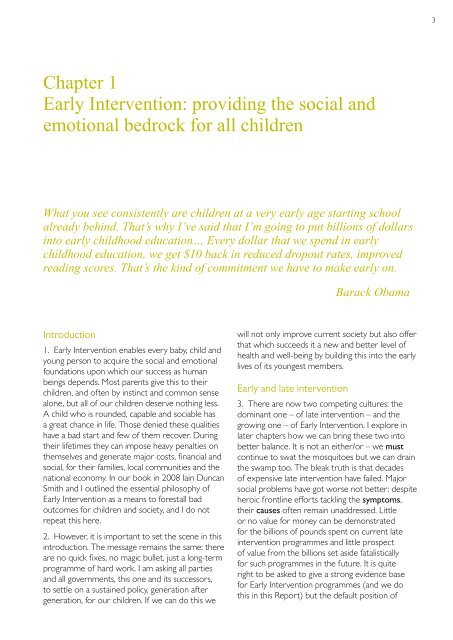early-intervention-next-steps
early-intervention-next-steps
early-intervention-next-steps
Create successful ePaper yourself
Turn your PDF publications into a flip-book with our unique Google optimized e-Paper software.
Chapter 1<br />
Early Intervention: providing the social and<br />
emotional bedrock for all children<br />
What you see consistently are children at a very <strong>early</strong> age starting school<br />
already behind. That’s why I’ve said that I’m going to put billions of dollars<br />
into <strong>early</strong> childhood education… Every dollar that we spend in <strong>early</strong><br />
childhood education, we get $10 back in reduced dropout rates, improved<br />
reading scores. That’s the kind of commitment we have to make <strong>early</strong> on.<br />
Introduction<br />
1. Early Intervention enables every baby, child and<br />
young person to acquire the social and emotional<br />
foundations upon which our success as human<br />
beings depends. Most parents give this to their<br />
children, and often by instinct and common sense<br />
alone, but all of our children deserve nothing less.<br />
A child who is rounded, capable and sociable has<br />
a great chance in life. Those denied these qualities<br />
have a bad start and few of them recover. During<br />
their lifetimes they can impose heavy penalties on<br />
themselves and generate major costs, fnancial and<br />
social, for their families, local communities and the<br />
national economy. In our book in 2008 Iain Duncan<br />
Smith and I outlined the essential philosophy of<br />
Early Intervention as a means to forestall bad<br />
outcomes for children and society, and I do not<br />
repeat this here.<br />
2. However, it is important to set the scene in this<br />
introduction. The message remains the same: there<br />
are no quick fxes, no magic bullet, just a long-term<br />
programme of hard work. I am asking all parties<br />
and all governments, this one and its successors,<br />
to settle on a sustained policy, generation after<br />
generation, for our children. If we can do this we<br />
Barack Obama<br />
will not only improve current society but also ofer<br />
that which succeeds it a new and better level of<br />
health and well-being by building this into the <strong>early</strong><br />
lives of its youngest members.<br />
Early and late <strong>intervention</strong><br />
3. There are now two competing cultures: the<br />
dominant one – of late <strong>intervention</strong> – and the<br />
growing one – of Early Intervention. I explore in<br />
later chapters how we can bring these two into<br />
better balance. It is not an either/or – we must<br />
continue to swat the mosquitoes but we can drain<br />
the swamp too. The bleak truth is that decades<br />
of expensive late <strong>intervention</strong> have failed. Major<br />
social problems have got worse not better: despite<br />
heroic frontline eforts tackling the symptoms,<br />
their causes often remain unaddressed. Little<br />
or no value for money can be demonstrated<br />
for the billions of pounds spent on current late<br />
<strong>intervention</strong> programmes and little prospect<br />
of value from the billions set aside fatalistically<br />
for such programmes in the future. It is quite<br />
right to be asked to give a strong evidence base<br />
for Early Intervention programmes (and we do<br />
this in this Report) but the default position of<br />
3



